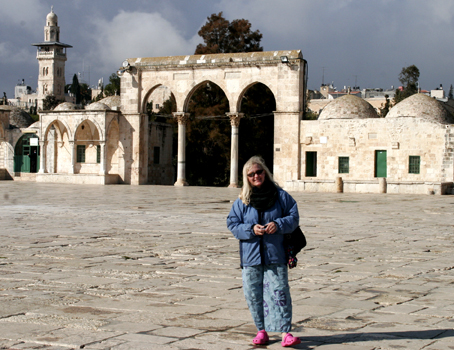Below is a note that I received from Lori Drummond-Mundal, an American Researcher who has lived in Norway for the past 18 years. She was an Assistant Professor at the University of Stavanger , Norway when I met her walking along the top of the ancient walls of Jerusalem in 2006 - Pete Sadel
Dear Friends,
There are many who have written asking me how life in Norway is these days in the aftermath of the terrorist acts one week ago. I have written some observations and reflections and share them here with you.
“If one man can create so much hate, just imagine how much love we can create together”
Stine Renate Håheim, a survivor of Utøya shootings, quoting a friend during an interview with CNN 23 July 2011
Shock and grief have characterized Norway, both individually and collectively, since the incomprehensible and brutal attacks on the Government Quarter (Regjeringskvartalet) and on the youth camp at Utøya for Labor party youth last Friday, 22 July 2011.
These tragic attacks have ripped at the seams of Norwegian society. The result could have been division and destruction, but instead has revealed what appears to be at the heart of Norwegian society - the strength and dignity of unifying values. These first days of shock have been distinguished by a collective demonstration of caring, solidarity, and engagement. The response by the Prime Minister, the Royal family, and other government leaders has been moderated and determined. The revenge will be to further the values and ideals at the core of Norwegian culture that the perpetrator specifically attacked - more democracy, more openness, more tolerance.
And those values have been demonstrated by setting a tone of caring and solidarity. A motto at many memorials has been, “Standing together in grief”. As one of the young survivors said in an interview with Aftenbladet (Andreas Bjelland Erikson, leader of Rogaland AUF), “Now we see that our multicultural society is built on valuing humanity and solidarity. This shows that his battle is lost and ours is won. Freedom, equality, brotherhood, solidarity, these are the core of our beliefs and what we fight for”.
It is said that one’s true nature is revealed in a crisis. If that is correct, then the true nature of the Norwegian people, culturally, socially and politically, is a model for humanity. The fact that Norway has been placed at or near the top of the UN Human Development Index over the past decade, would seem to be not only a product of the good fortune to have oil riches, but also to do with the values at the core of social democracy.
Still, Norway is not a perfect place, as this terrible act by a citizen of privilege has demonstrated. Ideals paint a pretty picture, their implementation leaves room for improvement. A time for reflection will come, is in fact beginning among those who have not been directly affected by the the bombing or the shooting, who can just begin to lift their heads and see the social and political landscape around this incident. Consideration must be given to how extreme ideologies are expressed (or suppressed) in Norwegian society, to the realities of multiculturalism, to attitudes held and articulated in families, among colleagues, friends, in the public sphere.
Some find it particularly hard to swallow that these acts was perpetrated by “one of our own”. His manifesto is one of division, hatred, racism. This represents a counter culture to the “middle path” mainstream in Norway. On the other hand, there is reason to believe that had the perpetrator been Muslim extremists, al Qaeda or the like, or immigrants to Norway who have gone to our schools and mosques, the atmosphere after the attacks would have been very different, full of fear and mistrust and vengeance. Indeed, there were verbal and physical attacks on people with a Muslim appearance (for example wearing a hijab) in the period immediately following the bombing, before it was known that the perpetrator was Norwegian.
This brutal attack has provided a sort of mirror for the Norwegian people. At first glance the reflection reveals values in action, love, unity, engagement. But there are shadows in that mirror. Extremism, xenophobia, prejudice. The time must come to find the courage to examine the shadows in Norwegian society as well. Not to do so would be naive and dangerous.
It seems only the media, the police and the justice system actually state the name of the perpetrator of this heinous crime. Individuals, even politicians, appear not to be willing to hold his name in their mouths. He will not be remembered. Those who have lost their lives will be remembered. The strength of values that have held the tapestry of Norwegian society together during this crisis will be remembered. And one can hope that those memories will serve as a rudder to keep a safe and open course into the future development of the multicultural Norwegian society that is a reality today.
